Potty training a senior dog can be a bit more challenging than training a puppy, but it is definitely possible. In this article, we will cover the steps to re-train or train them for the first time to go to the toilet.
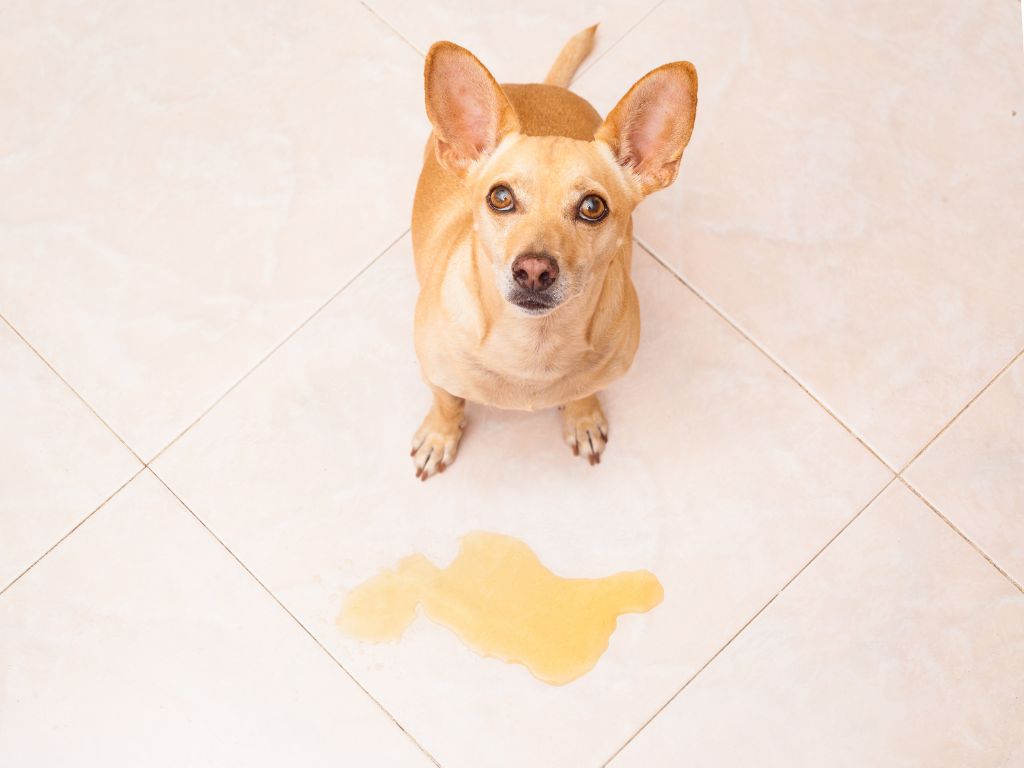
But first, let’s cover why potty training a senior dog may be more difficult than training youngsters. The explanation is that when our pups age they lose physical and cognitive abilities that can difficult to control their bodily functions. Urinary diseases and cognitive decline are common medical conditions in seniors that contribute to this problem.
However, with patience, understanding, and the right approach, it is possible to help your senior pup regain their confidence and maintain a comfortable routine.
Here is the approach we recommend:
Potty train a senior dog in 5 steps
1. Evaluate their health:
Before starting the potty training process, make sure to take your senior dog to the veterinarian to rule out any medical conditions that may be causing accidents. As we mentioned before, it is not uncommon that certain health issues, such as urinary tract infections, incontinence, or cognitive decline, can contribute to accidents in older dogs.
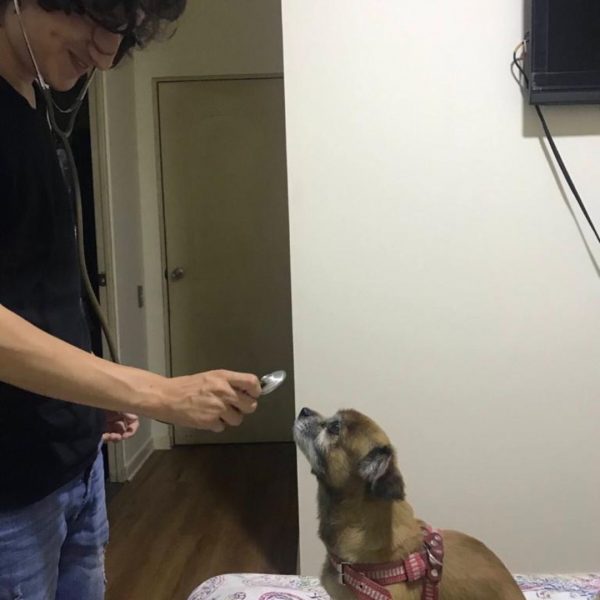
Read more: Senior Dog 101: Our Curated Care Guide for Senior Dogs
2. Establish a routine:
Dogs thrive on routine, so establish a consistent schedule for feeding, bathroom breaks, and exercise. Take your dog outside to the designated potty area at regular intervals throughout the day, such as first thing in the morning, after meals, and before bedtime.
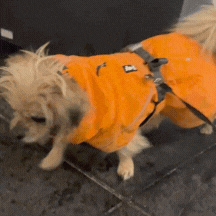
3. Use positive reinforcement:
Just like with puppies, positive reinforcement is key in potty training a senior dog. When your dog pees in the appropriate spot, immediately praise them and offer a treat. This will help them associate going potty outside with positive rewards.
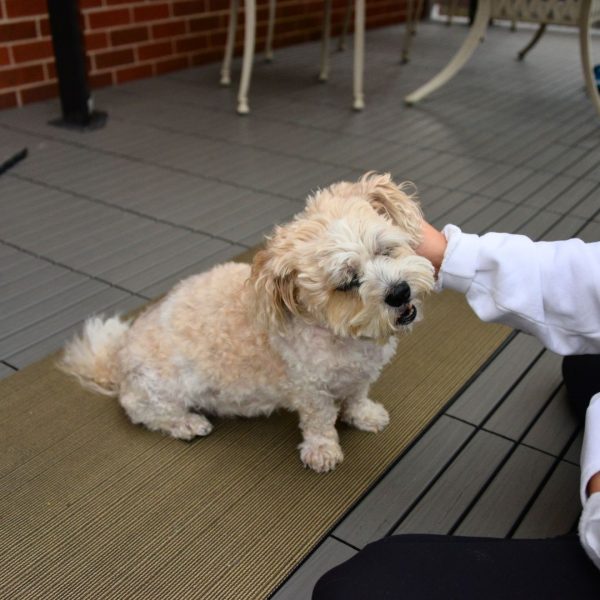
4. Supervise:
Until your senior dog is fully potty trained, it’s important to supervise them closely and confine them to a designated area. This can be a crate or a small puppy-proofed room with a comfortable bed. This will help prevent accidents and give your dog clear boundaries.
5. Clean accidents thoroughly:
Accidents happen, especially during the potty training process. However, it is important to clean them thoroughly to eliminate any lingering odor. If the odor is not removed properly, it can attract your dog, or they might interpret it as an appropriate place to relieve themselves.
Start by wiping the area with a cloth or paper towel to remove any excess urine. Mix a solution of equal parts water and vinegar. Alternatively, you can use an enzymatic cleaner. Pour the solution onto the soiled area, leave it for a few minutes, then wipe again. Finish by rinsing the area with a wet paper towel.
Why is my older potty-trained dog peeing in the house?
There could be several reasons why your older, potty-trained dog is peeing in the house. A few of them are:
- Urinary tract infection: Dogs with UTIs may have accidents in the house due to discomfort and a sense of urgency to urinate. A vet can diagnose and treat this condition.
- Marking territory: Dogs naturally leave their scent on objects or areas to establish ownership and communicate with other dogs. If you suspect that this may be the cause of your dog’s behavior, it’s best to consult with a veterinarian or a professional dog trainer for guidance on how to address it.
- Anxiety or stress: When a dog is anxious or stressed, he may have difficulties controlling his bladder or bowels. It is important to address the underlying anxiety or stress issue and provide appropriate training. Common causes of anxiety and stress are separation anxiety, fear, or changes in the environment or routine.
- Cognitive decline: This condition can cause confusion and forgetfulness about house training. To address this issue, reinforce potty training by taking your dog outside frequently, rewarding them for going to the appropriate spot, and providing plenty of opportunities for exercise and mental stimulation. If the problem persists, consulting with a professional dog trainer or behaviorist may be beneficial.
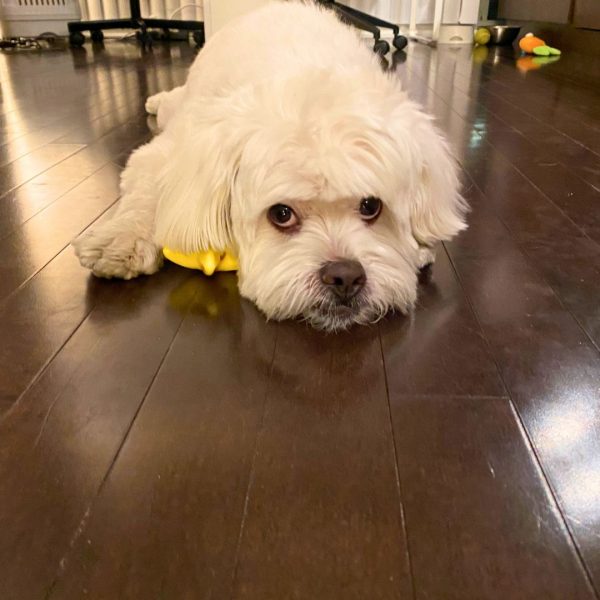
My experience:
I often board senior dogs, all of them potty trained, but accidents still happen. Sometimes because I don’t read the cues that they need to go outside or other times because the dog has tendencies to mark indoors. When this happens, I quickly take care of the accident and take them out just in case they need to finish doing their business 💩
I never punish any of my dogs under any circumstances, including house soiling. They don’t understand it. It is more likely that the dog may link the punishment with you and as a result, lose their trust in you. I prefer to reward and praise them when they pee in the right place, to let them know that they got it right.
Final Thoughts
Potty training a senior dog may take longer than with a puppy, so be patient and consistent with your training efforts. Stay consistent with the routine, positive reinforcement, and supervision until your dog consistently goes potty outside. Remember, every dog is different; some may take longer to potty train than others. With time, patience, and consistency, your senior dog can learn to become fully potty trained.
FAQs
Whether you live in a house or a small apartment, the steps to potty train your senior dog are the same. Rule out any medical condition, stick to a consistent routine, use positive reinforcement to help them understand where you want them to pee, and quickly clean up accidents.
Older dogs experience physical and mental decline that may contribute to house soiling. Some common medical conditions are urinary infections, incontinence, bladder stones, cystitis, doggie dementia, mobility issues, etc. We recommend you visit your vet as a first step to rule out any medical condition. If there is no apparent health issue, help your dog remember the house training.
House training a dog requires consistency, patience, and positive reinforcement. And even after graduating, they may need reminders in the future. Training is an important part of living with a dog. Having said that, if you want to house train your dog you should take your dog outside at regular intervals, choose a command such as “go potty,” to associate with the act of eliminating, reward good behavior, supervise and restrict access indoors, and clean accidents properly.
Related Articles:
Recent Posts
This summer, the temperatures are getting extremely high, and as you may know, dogs don’t sweat like humans to regulate their body temperatures. They mostly use their paws and breathing to cool...
Is the Dogo App Worth It? Honest Review After Training My Dog
Training your dog shouldn’t feel like another chore, but it often does because, unless you’re a professional trainer, you have to research everything yourself first. And that research can take...
